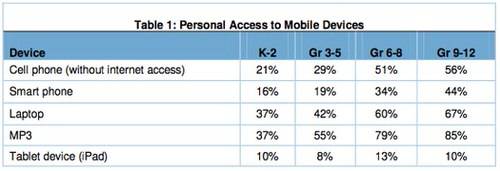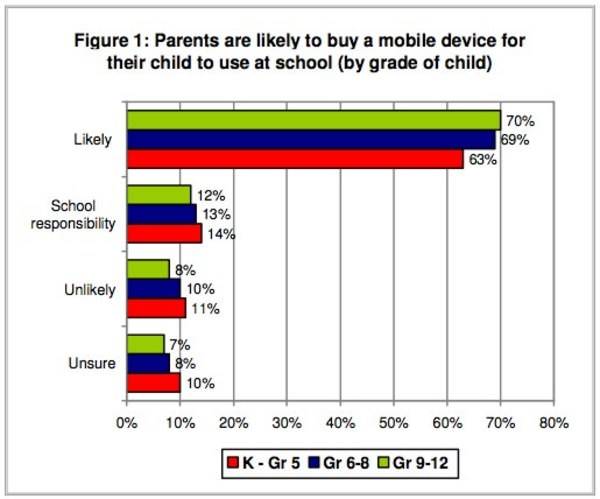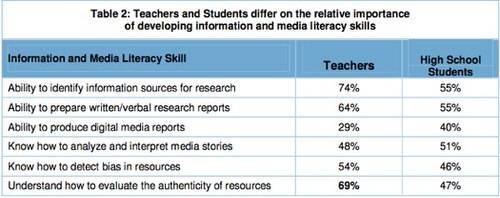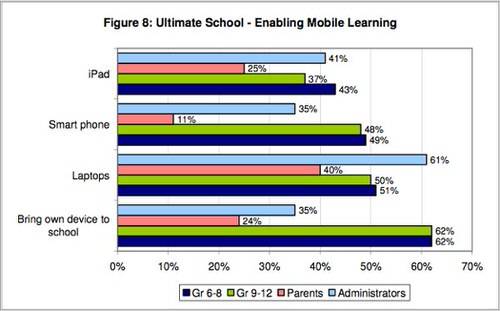iPads. Interactive Whiteboards. Netbooks. Video games. Although educational technologies are being implemented more and more in classrooms across the country, we don’t often stop and ask students – or their parents – what they think their technology needs are. But the newly-released Speak Up 2010 survey has done just that.

The project surveyed almost 300,000 students (along with 43,000 parents, 35,000 teachers, 2000 librarians and 3500 administrators) from over 6500 private and public schools last fall about how they’re using – and how they want to be using – technology for learning.
The results are pretty fascinating, as they show great adoption of technology among even very young students, but lingering resistance on the part of school administrators to sanction some of those tools into the classroom.
The two major obstacles that students say they face at school: filters that stop them from accessing the websites they need for homework and bans on using their own mobile devices (namely cellphones) at school.
What Students Want: BYOD (Bring Your Own Device)
The study found that 20% of kindergarten through second graders said they owned cellphones. 29% of third through fifth graders do. 51% of middle schoolers and 56% of high schoolers do. Smart-phone usage among these age groups is increasingly common too. 34% of middle school and 44% of high school students reported being smart-phone owners.

Smart-phone and cellphone ownership opens a lot of doors to the much-touted mobile learning, the ability for students to have 24-7 access to a computing device, whether they are at home or at school. And the high school students surveyed said that they were interested in using their phones at school to check grades (74%), to conduct research (68%), to take notes in class (59%), to collaborate and communicate with friends (53%), to use the calendar (50%), to access online textbooks (44%), to send an email (44%), to learn about school activities (40%), and to create and share documents and videos (37%).
The majority of parents surveyed – 67% – said that they were willing to buy their children a mobile device for school if the schools allowed it, and parents seemed particularly interested in their children using these devices in order to access online textbooks. In tough economic times, with schools facing increasing budget shortfalls, this parental willingness to foot the technology bill may be something educators want to pay attention to.

Despite students’ and parents’ interest, administrators in the survey were not supportive of cellphones in the classroom. “When we asked administrators about the likelihood of them allowing their students to use their own mobile devices for instructional purposes at school this year, a resounding 65% of principals said “no way!” And even within the cohort of administrators that use a smart phone themselves, only one-quarter of them said they are likely to allow students to use their own mobile devices this year.”
What Students Want: Unfiltered Access
The survey found much support for increased access to digital tools in the classroom, with educators, parents and students particularly interested in online textbooks. Nonetheless there were some interesting differences between what digital skills teachers thought were important and what skills students thought they needed to know.

Despite the national emphasis on increased use of digital tools and online learning, students say they continue to be frustrated by their access to technology at school. When a similar survey was undertaken five years ago, students’ number one complaint was the speed of Internet access at school. Now, they point instead to school filters and firewalls. 71% of high school students and 62% of middle school students say that the most important thing their school could do to make it easier for them to use technology would be to allow them greater access to the websites they need.
While CIPA, the Children’s Internet Protection Act, does require schools block students’ access to obscene and harmful images, filtering is often extended to a variety of other sites, including many social networks.
Are Schools Doing a Good Job with Instructional Technology?
How well are schools doing in leveraging new technologies to enhance learning? The survey asked that simple question to the various stakeholder groups (students, parents and educators). And the results are pretty telling:
74% of high school teachers, 72% of high school principals, and 62% of parents of high school age children said yes, they thought their school was doing a good job using technology to enhance learning and/or student achievement.
Only 47% of high school students agreed.

Top image credit: Scott McLeod










